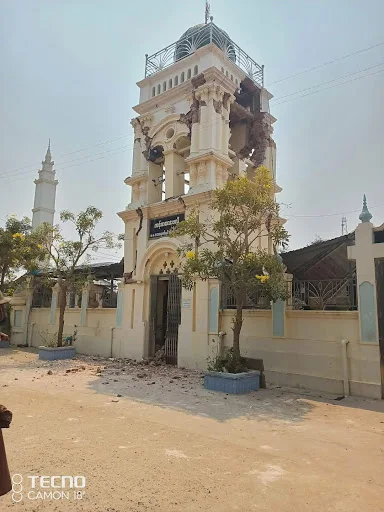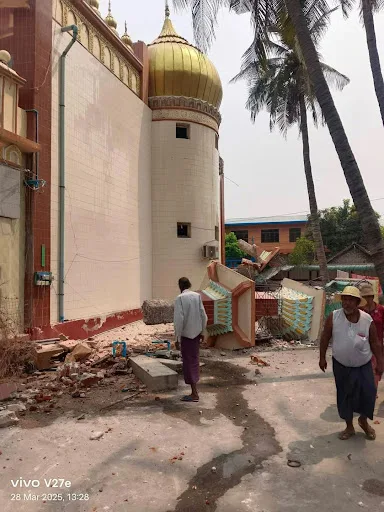Anekajātisaṃsāraṃ sandhāvissaṃ anibbisaṃ gahakāraṃ gavesanto dukkhā jāti punappunaṃ Gahakāraka diṭṭho'si puna gehaṃ na kāhasi sabbā te phāsukā bhaggā gahakūṭaṃ visaṅkhataṃ visaṅkhāragataṃ cittaṃ taṇhānaṃ khayamajjhagā (The Dhammapada, verses 153-154)
ဝန္ဒာမိ
Search This Blog
Total Pageviews
Sunday, March 30, 2025
List of monument impacted by earthquake
List of Mosques impacted by Earthquake…
Saturday, March 29, 2025
From Affection to Awakening: Rāhula's Journey of Renunciation and Spiritual Transformation in Early Buddhism"
From Affection to Awakening: Rāhula's Journey of Renunciation and Spiritual Transformation in Early Buddhism"
In the ancient texts, Rāhula's story begins with his birth, which coincided with Prince Siddhartha's decision to renounce worldly life. As recorded in the Nidānakathā, when informed of his son's birth, the future Buddha remarked "rāhula jāto, bandhanaṃ jātaṃ" ("A fetter (Rāhula) is born, a bondage has arisen").
The Mahāvastu describes how young Rāhula lived with his mother Yasodharā until age seven. When the Buddha returned to Kapilavastu, a touching episode unfolds in the Vinaya Piṭaka (Mahāvagga I.54): Rāhula approached the Buddha saying "Father, give me my inheritance." The Buddha, seeing his son's spiritual potential, instructed Sāriputta to ordain him as the first sāmaṇera.
The Buddha's special attention to Rāhula's spiritual development is evidenced in several important suttas:
1. In MN61 (Ambalaṭṭhikā Rāhulovāda Sutta), the Buddha emphasizes the importance of truthfulness and reflection, using the metaphor of a mirror to teach mindful self-examination.
2. MN62 (Mahā-Rāhulovāda Sutta) contains detailed instructions on meditation, particularly focusing on the elements and mindfulness of breathing.
The Theragāthā (Thag 4.8) contains verses attributed to Rāhula, where he declares:
"Twice blessed am I, whom my companions call
'The Fortunate One's son'; and that I won
To perfect insight, and can see things clear."
His dedication to the practice exemplified the ideal of a monastic disciple, demonstrating how family ties can be transformed into spiritual relationships.
While Rāhula matures, the meaning of his attachment to his father becomes increasingly complex. The act of renunciation, a key principle in Buddhist philosophy, requires an understanding that transcends simple sacrifice; Entrusts a deep spiritual awakening. In the *Majjhima Nikāya *, when the young Rāhula is ordered as a novice monk, he actively undertakes a path that challenges his original attachments. This transition symbolizes a critical point in the first Buddhist thought in which the expectation of family duties is juxtaposed against the search for lighting, suggesting that the progression from worldly attachments to spiritual realization is fundamental for understanding Buddhist practices.
References:
Sasson, Vanessa R., ed. Little Buddhas: Children and childhoods in Buddhist texts and traditions. Oxford University Press, 2013.
Fifield, Justin Andrew. Discipline and Ethical Formation in the Mahāsāṃghika Lokottaravāda Vinayapiṭaka. Harvard University, 2017.
Ohnuma, Reiko. Ties that bind: Maternal imagery and discourse in Indian Buddhism. Oxford University Press, 2012.
Gornall, Alastair. 9. Devotional Power: Buddharakkhita's Buddha Biography. (2020): 190-212.
Drewes, David. The problem of becoming a bodhisattva and the emergence of Mahāyāna. History of Religions 61.2 (2021): 145-172.
Harvey, Peter. An introduction to Buddhism: Teachings, history and practices. Cambridge University Press, 2012.
Bomhard, Allan R. An Outline Of the PālịCanon.
Crosby, Kate. Theravada Buddhism: continuity, diversity, and identity. John Wiley & Sons, 2013.
Almond, Philip C. The Buddha: life and afterlife between East and West. Cambridge University Press, 2023.
Young, Serinity. 10 Absence and Presence. Women, Gender and Art in Asia, c. 1500-1900 (2017): 268.
Skilton, Andrew. A concise history of Buddhism. Windhorse Publications, 1997.
Schober, Juliane, ed. Sacred biography in the Buddhist traditions of South and Southeast Asia. Motilal Banarsidass Publ., 2002.
Young, Serinity. South Asian Masculinities: Hegemonic and Fluid. God's Own Gender?. Ergon-Verlag, 2018.
Tatelman, Joel. The glorious deeds of Pūrṇa: A translation and study of the Pūrṇāvadāna. Vol. 9. Psychology Press, 2000.
Thakur, Amarnath. Buddha and Buddhist synods in India and abroad. Abhinav Publications, 1996.
Corless, Roger J. HELLENISTIC AND MEDIEVAL PERIODS HELLENISTIC EXPANSION The Indian Expedition of Alexander the Great (327-325 BC) opened up the land of the philosophers to the West, which then, as now in some circles, competed with Ancient Egypt as a source of Gnosis. Contact is pre. Buddhism--a Modern Perspective (1975): 248.
Zhang, Juyan. The Creation of Avalokiteśvara: Exploring His Origin in the Northern Āgamas. Canadian Journal of Buddhist Studies 12 (2017).
OHNUMA, Reiko. Sex Rules in the Vinaya. Buddhism and the Senses: A Guide to the Good and Bad (2024): 205.
Prebish, Charles S., and Damien Keown. Buddhism: The ebook: An online introduction. JBE Online Books, 2010.
Law, Bimala Churn. On the Chronicles of Ceylon. Asian Educational Services, 1994.
Friday, March 28, 2025
Urgently seek international support for the victims of the devastating earthquake.
Urgently seek international support for the victims of the devastating earthquake that has recently struck Myanmar, leaving countless families displaced, injured, and in dire need of humanitarian assistance.
The earthquake has caused widespread destruction, severely impacting communities and infrastructure. Many have lost their homes, and access to essential supplies such as food, clean water, and medical aid remains critically limited. Immediate relief efforts are necessary to address the suffering of those affected and to begin the process of rebuilding lives and communities.
In this time of crisis, we humbly appeal to governments, humanitarian organizations, and compassionate individuals worldwide to extend their support through donations, medical aid, and emergency relief supplies. Your contributions can help provide urgent necessities, including shelter, healthcare, and sustenance, to those most in need.
We also encourage international agencies to collaborate with local organizations to ensure that aid reaches affected communities efficiently and effectively. Your solidarity and generosity can make a profound difference in the lives of those who have lost so much.Every act of kindness, no matter how big or small, will help Myanmar recover from this disaster.
Sao Dhammasami






